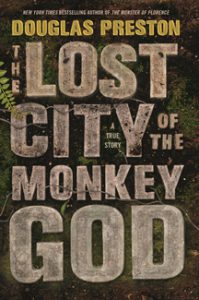“The Lost City of the Monkey God” (January, hardcover) looks from its cover like the latest Douglas Preston thriller, perhaps along the lines of “The Codex,” something about tromping through Central America in search of a lost city. But that little notation “A True Story” isn’t a “Fargo”-style joke. “Lost City” is a work of journalism chronicling the discovery of a pre-Columbian city – deserted and left to jungle encroachment 500 years ago – in the 21st century.
There is some controversy about the word “discovery” – outlined in this book – in that the people of Honduras and many archeologists, looters and gold-prospectors have long known about the city, located in the Mosquitia region of Honduras. Indeed, it’s a combination of myths about the Lost City of the Monkey God — also known as the White City – and real writings and maps that lead to the joint American/Honduran archaeology expedition in this book. (Also on the trip is the TV crew making the 2015 “National Geographic Explorer” episode “Legend of the Monkey God.”) However, it’s also clear that the precise location of the city (in fact, two cities that are candidates to fit the myth) could only be pinpointed thanks to the relatively new technology of lidar (laser imaging).
The book includes some pages of photographs in the middle, which mostly seem to show jungle. That’s a little disappointing, but it also starkly illustrates the value of lidar and the expertise of archaeologists who can spot things that aren’t obvious to a layman. A picture is generally worth a thousand words, but when those pictures are just shrouds of jungle, the opposite holds true.
I didn’t know exactly what I was getting into, but I enjoyed the journey – and I was thrilled that I was a reader, not a participant. In journalistic style, Preston (whose other nonfiction highlights include “The Monster of Florence” and “Jennie”) writes about his encounters with deadly fer-de-lance snakes, biting sand flies and screeching howler monkeys. These animals don’t behave cautiously around humans, because they’ve never seen one before – nor had a half-millennium of their ancestors. Preston, known for the Agent Pendergast and Gideon Crew thrillers co-written with Lincoln Child, also employs novelist’s prose, like when the character of a beautiful river turns ominous.
The book takes a surprising turn about midway when Preston chronicles his post-expedition battle with leishmaniasis, a condition that came from sand fly bites in Mosquitia. It’s scarier than anything I’ve read in a Preston thriller. The author recounts his struggle to find treatment, the horrors of the treatment itself, and in a parenthetical notation, the fact that his leishmaniasis seems to have returned at the time of the writing. To top it off, he notes that he’s LUCKY to be a First World citizen with leish; Third World inhabitants have no access to treatment.
“Lost City” isn’t a thrilling page-turner like Preston’s novels; it’s more of a cerebral pursuit, but it’s certainly not homework. In addition to providing me with a fun trivia answer (bananas are annually the best-selling item at Walmart), the book vastly increased my knowledge of lidar, the Central American jungle, the history and current government of Honduras, the logistics of mounting and surviving expeditions, and the meeting of the Old and New Worlds — but most of all, the spread of disease.

Although the ultimate reason for the disappearance of the White City is almost certainly the Old World invasion of smallpox and other horrors, Preston strings out the “mystery” effectively and with fascinating historical insights.
History holds plenty of lessons about empire-building, war and debt that the modern world could stand to learn from, but “Lost City” harrowingly puts disease at the top of my list of concerns (at least until another distraction comes along). It’s a scary final thought to top off “Lost City’s” broader, more spiritual, point: Even in the 21st century, the Earth holds mysteries.

